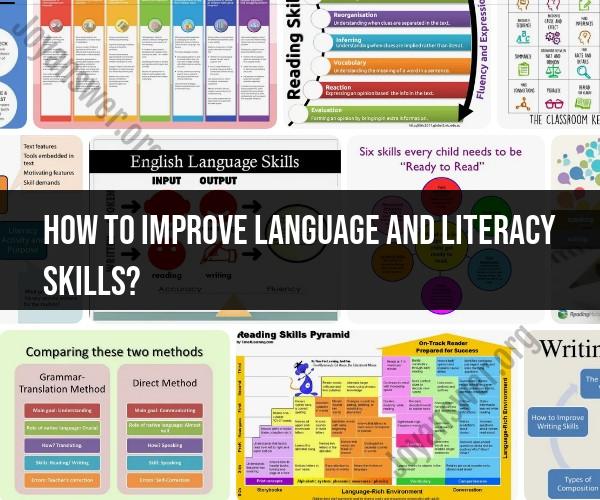How to improve language and literacy skills?
Improving language and literacy skills is essential for effective communication and lifelong learning. Whether you're working with children or seeking to enhance your own skills, here are some practical tips to improve language and literacy skills:
For Children:
Read Aloud: Reading aloud to children from a young age exposes them to language and builds their vocabulary. It also helps them develop listening skills and a love for reading.
Encourage Storytelling: Encourage children to tell stories, even if they're made up. This helps them practice forming sentences and expressing ideas.
Visit the Library: Regular trips to the library expose children to a wide variety of books and reading materials. Many libraries also offer storytelling sessions.
Use Educational Apps: There are many educational apps designed to improve literacy skills. Choose age-appropriate apps that focus on reading, spelling, and phonics.
Play Word Games: Games like Scrabble, Boggle, and word search puzzles can be both fun and educational. They help expand vocabulary and improve spelling.
Practice Phonics: Teach phonics and letter sounds to help children learn how to decode words. Many books and online resources are available for phonics instruction.
For Adults:
Read Regularly: Reading newspapers, magazines, books, and online articles can expose adults to new words and concepts. Reading regularly is one of the most effective ways to improve literacy.
Join a Book Club: Joining a book club or reading group can motivate you to read more and engage in discussions about what you've read.
Write Daily: Keeping a journal, writing emails, or even blogging can help improve writing skills. Try to write on a variety of topics to expand your vocabulary.
Expand Vocabulary: Make an effort to learn new words each day. Use a dictionary or vocabulary-building apps and websites. Try to use these words in sentences.
Take a Writing Course: If you're serious about improving writing skills, consider enrolling in a writing course or workshop. Many universities and online platforms offer writing courses.
Practice Active Listening: Active listening is an essential part of effective communication. Pay attention to how others express themselves and learn from their speaking and writing styles.
For All Ages:
Engage in Discussions: Engaging in conversations with others can improve both listening and speaking skills. Discussions can be informal with friends or more structured in a debate or discussion group.
Use Language Learning Apps: Apps like Duolingo, Rosetta Stone, and Babbel can help improve language skills if you're learning a new language or want to strengthen existing language skills.
Seek Feedback: Don't be afraid to ask for feedback on your writing and speaking. Constructive feedback from peers, teachers, or colleagues can help you identify areas for improvement.
Read Aloud: Just as it's beneficial for children, reading aloud as an adult can help improve pronunciation and speaking fluency.
Set Goals: Set specific language and literacy goals for yourself. Whether it's reading a certain number of books per month or improving your vocabulary, having goals can keep you motivated.
Be Patient: Language and literacy skills take time to develop. Be patient with yourself or with those you're helping to teach. Consistency and practice are key.
Remember that improving language and literacy skills is a gradual process. What's important is to make learning a part of your daily routine and to enjoy the journey of discovering new words and ideas through reading and communication.
Enhancing Language and Literacy Skills: Strategies for Improvement
There are a number of strategies that can be used to enhance language and literacy skills. Some of the most effective strategies include:
- Reading regularly: Reading is one of the best ways to improve language and literacy skills. It exposes readers to new vocabulary, grammar structures, and writing styles. It also helps to develop comprehension skills and critical thinking skills.
- Writing regularly: Writing is another important way to improve language and literacy skills. It allows individuals to practice using language effectively to communicate their thoughts and ideas. Writing also helps to develop grammar and punctuation skills.
- Talking regularly: Talking is a great way to develop oral language skills. It allows individuals to practice using language to communicate with others in a variety of contexts. Talking also helps to develop listening skills and the ability to respond to others.
- Engaging in meaningful activities: Participating in meaningful activities that involve language and literacy is another great way to improve these skills. For example, individuals can read and discuss books, write in a journal, or participate in book clubs or writing workshops.
Literacy Development: Tips for Boosting Language and Reading Skills
Here are some tips for boosting language and reading skills:
- Start early: Literacy development begins at birth. Parents and caregivers can help to promote literacy by talking to their babies and reading to them regularly.
- Make reading fun: Reading should be a pleasurable experience. Choose books that your child enjoys and make reading a part of your daily routine.
- Talk about what you read: After reading a book, talk to your child about the story, the characters, and the illustrations. This will help them to develop comprehension skills and critical thinking skills.
- Provide opportunities for writing: Encourage your child to write in a variety of contexts, such as writing in a journal, writing stories, and writing letters.
- Create a literacy-rich environment: Surround your child with books and other literacy materials. This will help them to see that literacy is an important part of life.
Lifelong Learning: How to Improve Language and Literacy Skills at Any Age
It is never too late to improve language and literacy skills. Here are some tips for lifelong learners:
- Set goals: What do you want to achieve in terms of your language and literacy skills? Once you know your goals, you can develop a plan to achieve them.
- Find a mentor or tutor: If you need help improving your language and literacy skills, consider finding a mentor or tutor. They can provide you with guidance and support.
- Take a class: There are many classes available that can help you to improve your language and literacy skills. Look for a class that is appropriate for your level and interests.
- Join a club or group: There are many clubs and groups available that focus on language and literacy. Joining a club or group can be a great way to practice your skills and meet other people who are interested in learning.












